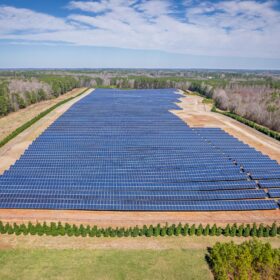Shift to 2 kV voltage in solar projects tipped to gain traction
Amid record-low prices for solar modules, the focus of cost reduction for utility-scale solar projects is shifting to non-module balance-of-system (BoS) expenses. A transition from 1.5 kV voltage to 2 kV in solar projects is expected to gain traction through 2030.
Flexible interconnection can generate 176% more revenue for community solar, report finds
A report by the Solar and Storage Industries Institute shows that flexible interconnection, which adjusts solar output based on grid conditions, can offer significant economic benefit to community solar developers.
The use of AI in hydropower plants is creating new challenges
Hydropower has long been used to stabilize the rid and store energy to compensate for the fluctuations of solar and wind power. Its use of artificial intelligence is helping cope with new demands but making it more sensitive to cyber attacks.
New research finds utility-scale solar facilities foster biodiversity
A series of longitudinal studies of three solar-pollinator sites in Minnesota have demonstrated evidence of native prairie growing under solar panels, providing both soil benefits and habitat for wildlife and pollinators.
A fast interconnection process like that used in Texas is widely supported
Texas is quickly adding solar, wind and storage to its grid by using a relatively simple interconnection process, and now 24 industry participants have expressed support for the use of a similarly streamlined process across the nation.
Massachusetts House passes climate bill, setting example for other states to follow
The Massachusetts bill includes siting reform, which will help speed the buildout of solar and other clean energy technologies.
Sunrise brief: Solar stocks plummet, market is “wildly emotional” about Trump
Also on the rise: 500 GW of solar could interconnect at existing fossil-fired generators. The great untapped potential of virtual power plants
global installed PV capacity tops 2 TW. And more.
The great untapped potential of virtual power plants
We need every tool in the toolkit to improve grid reliability, and we need them now, RMI’s managing director, Mark Dyson, told the pv magazine USA Week audience.
500 GW of solar could interconnect at existing fossil-fired generators
Fossil generators sharing their point of interconnection with renewable generators could be a “mainstream strategy” for integrating solar, wind and storage “at speed and scale,” say four researchers.
Solar wins on cost
On Day One of pv magazine USA Week, a panel of experts explored the levelized cost of energy as well as current challenges to capacity expansion.















